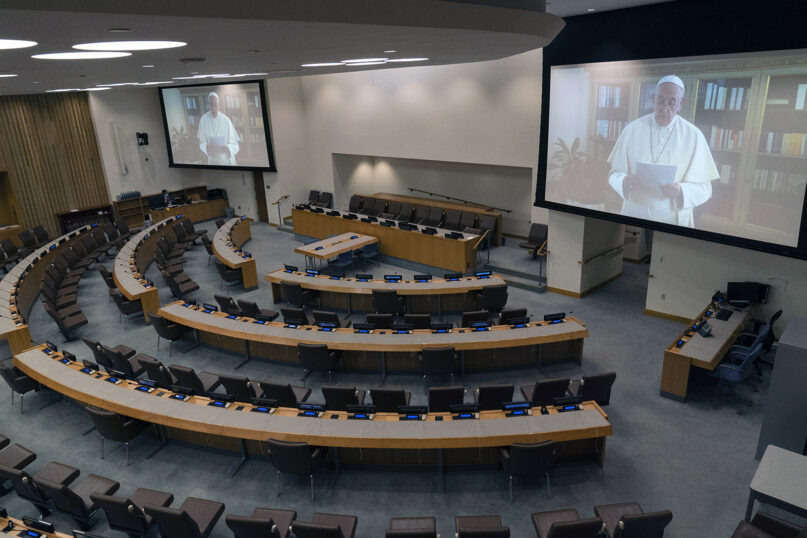VATICAN CITY (RNS) — In a video message to the United Nations, Pope Francis said the COVID-19 pandemic has put the international community at a crossroads and that it’s up to U.N. leaders to decide whether to choose the path of multilateralism and dialogue or nationalism and individualism.
“We are faced, then, with a choice between two possible paths,” the pontiff said on the occurrence of the 75th anniversary of the United Nations (Sept. 25).
On one side, he said, there is “a solidarity grounded in justice and the attainment of peace and unity within the human family, which is God’s plan for our world,” while the other path, he warned, “emphasizes self-sufficiency, nationalism, protectionism, individualism and isolation.
“It must not prevail,” he added.
The pope’s comments come weeks before the presidential election in the United States, and Francis noted various issues of international cooperation, including immigration and the environment, issues on which the Trump administration has received criticism for a lack of leadership.
“The pandemic has highlighted the urgent need to promote public health and to make every person’s right to basic medical care a reality,” Francis said, renewing his appeal that vaccines for the coronavirus be administered with every effort “to the poorest, the most vulnerable, those who so often experience discrimination because they have neither power nor economic resources.”
RELATED: Pope Francis launches his post-COVID agenda with announcement of new encyclical
The pope spared no punches when recounting the “gross lack of respect for human dignity” displayed in the “craving for absolute power and control that is widespread in today’s society.”
“Let us name this for what it is: an attack against humanity itself,” Francis said.
He mentioned religious persecution, especially in the cradle of Christianity in the Middle East, where faithful have been forced to flee their homes. He also spoke of the refugees and migrants who face a hostile environment both in their country of origin and destination.
“Worse still, thousands are intercepted at sea and forcibly returned to detention camps, where they meet with torture and abuse,” Francis said. “Many of these become victims of human trafficking, sexual slavery or forced labor, exploited in degrading jobs and denied a just wage.
“This is intolerable, yet intentionally ignored by many,” he added.
According to the pontiff, the inequality exacerbated by the COVID-19 pandemic calls for “reconsidering the role of economic and financial institutions.” For Francis, this means creating a preferential option for the poor and most vulnerable, including debt forgiveness for nations and the removal of economic sanctions.
Just as Pope Francis works to clean up the scandal-ridden Vatican finances and publish his encyclical on fraternity and economy in October, the pontiff insisted on the need to “close tax shelters, avoid evasions and money laundering that rob society.
“Now is a fitting time to renew the architecture of international finance,” he said.
Pope Francis spoke to the U.N. five years ago, a moment he described as being “of great hope and promise for the international community,” as it prepared for the ambitious 2030 goals for Sustainable Development and the adoption of the Paris Agreement on Climate Change.
Under President Donald Trump, the United States announced its intention to withdraw from the 2016 Paris agreement, which required the reduction of greenhouse-gas emissions.
“We must honestly admit that, even though some progress has been made, the international community has shown itself largely incapable of honoring the promises made five years ago,” Francis said.
RELATED: ‘Don’t lose hope,’ Pope Francis tells diplomats amid war, climate change concerns
The pontiff pointed to the destruction and blaze of the Amazon forest, which was at the center of his 2019 summit of Catholic bishops at the Vatican. He also pointed to the dangers facing children in the wake of the pandemic, who are more vulnerable to exploitation and abuse while not being able to attend school.
“Sad to say, some countries and international institutions are also promoting abortion as one of the so-called ‘essential services’ provided in the humanitarian response to the pandemic,” Pope Francis said, calling out “how simple and convenient it has become for some to deny the existence of a human life as a solution to problems that can and must be solved for both the mother and her unborn child.”
The advancement of women was also a key part of the pope’s speech, on occasion of the 25th anniversary of the Beijing Conference on Women in 1995, a turning point for gender equality with the attendance of the Holy See.
“Many women, however, continue to be left behind: victims of slavery, trafficking, violence, exploitation and degrading treatment,” he said, stating his “fraternal closeness” to women who remain victims of abuse and ill treatment.
Picking up on his comments during the papal visit last year to the Japanese sites of Hiroshima and Nagasaki, hit by nuclear weapons by the United States in 1945, Pope Francis criticized nuclear deterrence as an international alternative to diplomacy.
RELATED: Pope says no more nukes — even possessing nuclear weapons is ‘immoral’
“We need to break with the present climate of distrust,” he said, pointing to dialogue as the only way to promote peace.
The current pandemic, he added, has highlighted human vulnerability and injustice, reminding people “that we cannot live without one another.
“We never emerge from a crisis just as we were. We come out either better or worse,” he said. “This is why, at this critical juncture, it is our duty to rethink the future of our common home and our common project.”
Despite hurdles and disappointments, the pope said the United Nations still holds the promise “to transform the challenge that lies before us into an opportunity to build together, once more, the future we all desire.”





